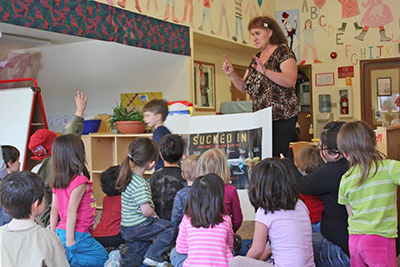Tobacco-Free Alaska > Community Spotlight > September 2017
September 2017 Community Spotlight: LISTENING AND STEADY PRESENCE = SUCCESSFUL OUTCOMES

By Larry Kairaiuak, Grant Program Manager
Listening and fostering partnerships among the Copper River and Prince William Sound communities has helped Sheila Hurst and the Alaska Tobacco Prevention and Control grantee program advance tribal policy work in the Gulf Coast region and add to the growing trend of tobacco-free tribes across Alaska.
Gaining and maintaining trust with Alaska Native local policy makers and key stakeholders has been one of the key components that have contributed to Copper River Native Association’s (CRNA) tobacco prevention and control program’s success. Sheila takes time to engage and learn from their stories, learning about the unique events that have shaped the lives and communities where she works.
Sheila has integrated tobacco prevention and initiation activities into her work with schools, cultural events or summer camps, community meetings, and many other local events by tailoring the message to youth tobacco prevention. This is important to many Elders, local leaders, and parents. Sheila’s willingness to assist with activities not directly tied to tobacco prevention efforts was a key component for developing trust and becoming successful. Through her work with multiple partners, she creatively found ways to incorporate core tobacco prevention messages.
"You can move a mountain with a teaspoon. It just takes time."
– Robert Hurst
"You can move a mountain with a teaspoon. It just takes time." – Robert Hurst
With that simple supportive statement in mind, Sheila was determined to face challenges in local communities. Prior to 2012 and before Sheila arrived in Copper River Basin, there was very little traction in the policy efforts with tribal communities, organizations, or workplaces by CRNA. Sheila began working with key CRNA personnel on simple messages to begin addressing tobacco use and the importance of CRNA as a health organization. The message of promotion and commitment to wellness was simple, yet powerful. Sheila knew that tobacco prevention could be easily integrated into the concept of health and wellness. It was just a matter of time. With a brand new clinic opening soon and the need to ensure that staff and the beneficiaries took pride in the new building, the tribal health organization moved to adopt a comprehensive tobacco-free campus policy under the concept of health and wellness promotion., The policy included all clinic campus grounds, buildings, owned or leased vehicles, and CRNA-sponsored events. To date, CRNA has one of the most comprehensive tobacco-free campus policies and continuously monitors its implementation procedures.
Sheila’s success in CRNA came after she evaluated her approach with local tribal leaders, specifically her communication to local stakeholders. She noted tribal confusion on the message of education and advocacy for local policies.–Sheila said tribes misunderstood that she was telling them that they should not use tobacco. She clarified that she was not telling them what to do, but rather was encouraging them to protect their tribal members, especially the most vulnerable Elders and youth from exposure to secondhand smoke. Tribes became more receptive after having these types of conversations and clarifying the message. Within a year, six out of seven tribes in the Copper River service area adopted the tobacco-free tribal policy.
Sheila’s success with tribes also served as the catalyst for passing policies in other communities and among other organizations in the Copper River Basin and Prince William Sound. From healthcare organizations, behavioral and mental health organizations, to individual businesses, Sheila has effectively communicated to the importance of embracing and adopting tobacco-free or smokefree workplaces and campuses.